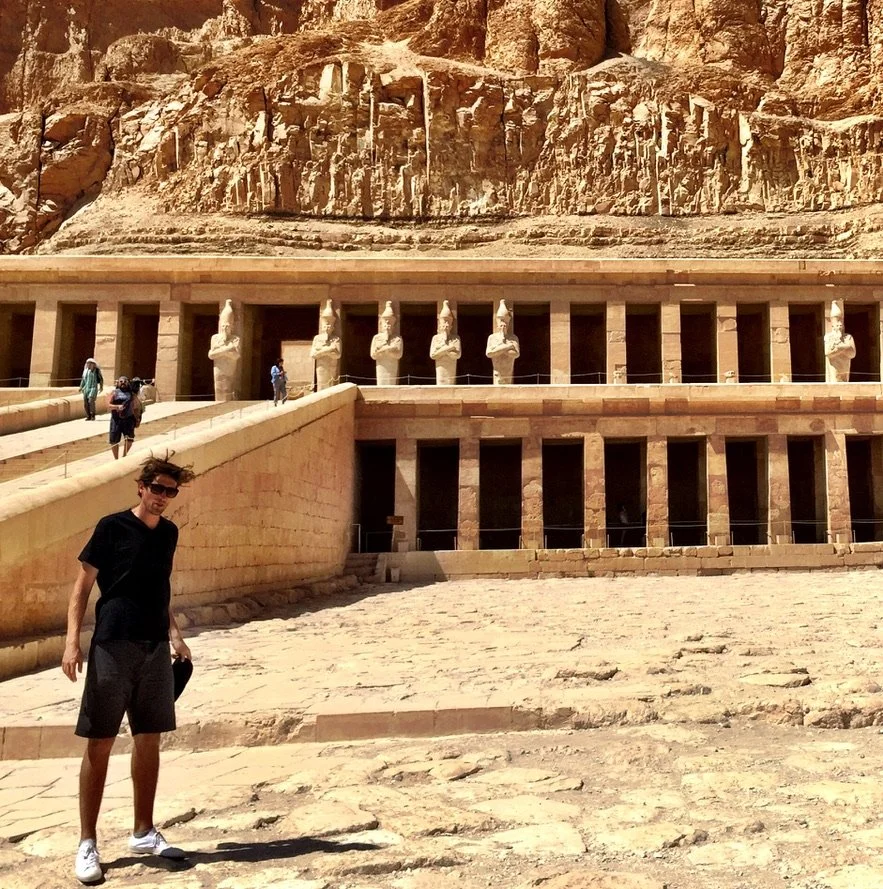Death on the Nile
by Agatha Christie
First Posted Oct 2015
My first and only Agatha Christie book. Read in Egypt. What a treat for me.
Recently, a few of my reviews ended up being posted later than I would have liked because my foot suffered from a bad case of mummy rot (are their any good cases of mummy rot?). Why is my personal health relevant to this review? Because I was stricken with plague while within spitting distance of the Nile. And while I may have forcibly crawled up my own butt about how time and place can increase the impact of a novel, it is pertinent. Reading Death on the Nile while touring Egypt was really, really cool. Not simply because I saw the same sights that the characters saw, but because the tourism has barely changed since the book was written nearly eighty years ago. In a land that sits in the shadow of the Pyramids, I suppose a single century barely makes a splash.
The camel I rode was named Whisky Soda; I laughed when I saw a donkey of the same name near the opening of Death on the Nile, a clear delineation of generational tourism continuity. I bought a plaster scarab, of which Jacquelline de Bellefort and Hercule Poirot would not have approved:
“Is that your excursion today, Mademoiselle? Eh bien, they are picturesque—but do not spend large sums on native curios.”
“Which are shipped here from Europe? No, I am not so easy to deceive as that.”
I, without question, am that easy to deceive. Or, at least, I tend to get swept away by atmosphere. My gullibility—which I prefer to term active engagement in creating experiences—aided my enjoyment of my first Agatha Christie novel as much as it did while touring Cairo and Luxor. I let the red herrings ensorcell me like an episode of Scooby Doo; I never tried to outthink the plot or predict what had—or might—happen, which was also what made Gone Girl so enjoyable for me.
Books are a great format for mysteries because you are alone with the words; you can let them move you at their own pace. When entertainment is social—you watch a movie with someone who has already seen it, for example—you’re constantly trying to guess what is happening so you seem clever, or saying things like, “Who’s that guy?” or, “She’s the killer, right?” so you don’t fall behind. You don’t engage primarily with the fiction because you’re trying to engage with your real-life friends. “You” in this context means “me.” But it might mean “you” to you (meaning “me”), as well. This is, to you (meaning “me”), only slightly less irritating than being with someone—or being someone—that has already seen the movie and continues to say things like “Just wait!” or keeps sucking air in through their teeth in anticipation of some sort of surprise. We get it; you’ve seen the movie. Now let me do the same! I think it is so weird that the normative cultural standard is to go to the theater in a two-plus person group. I suppose the fifteen minutes before the lights dim would be less enjoyable, as would the lack of common experience to reminisce over on the trip home. Those are small prices to pay for an internal voyage into the magic of cinema, but books keep you focused because unless you have a younger sibling, no one is likely reading over your shoulder. No one is gasping right before the big reveal; the plot comes to you when it comes to you.
So you don’t have to look smart in front of Dame Agatha Christie. You probably won’t. Death on the Nile is convoluted, purposefully retroactively comprehensible, and thick with intermingled poignancy and pointlessness. Great to drift away with while waiting at the airport or cruising down the Nile. And I was not the only Dinaburg that thought so.
You see, through coincidence or kismet I was able to borrow a copy—not from the library—but from my dad, who had taken this very same book to Egypt seven years (nearly to the day!) before me. He has a habit of writing in the margins: about the text; about the day; about himself. And while I was pleased with the overlap I had with the characters of Linnet and Fanthorp and Miss Van Schuyler, reading about my father’s trip was even more exciting. Following his trail through ancient ruins as I read notes from his journal and eventually seeing our paths converge is probably the closest I will ever get to being Harrison Ford in Indiana Jones and the Last Crusade.
Death on the Nile is a nice way to pass some time while you’re touring Egypt; I have no context for it outside of that country. If you have the book already, interpret that as an omen telling you to go to Egypt:
“I always make my plans well in advance.”
“You don’t just move on from place to place as the fancy takes you? Isn’t the latter really pleasanter?”
“Perhaps. But to succeed in life every detail should be arranged well beforehand.”
Heed the omen, find your way to Egypt, and know you have chosen wisely.


